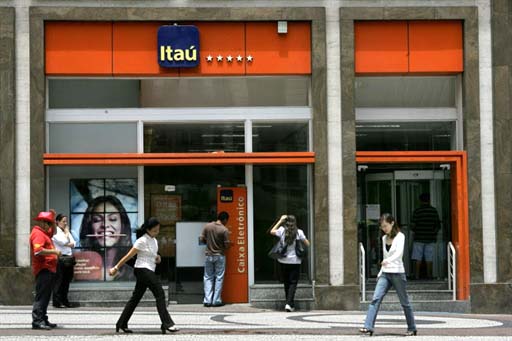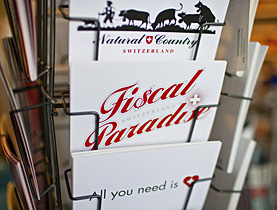Developing economy banks move to Switzerland

Banks from Asia, the Middle East and Latin America are slowly starting to plug the hole left by their European counterparts that have departed from Switzerland.
Brazil’s Itau private bank is the latest enterprise to apply for a Swiss banking licence as financial institutions in developing economies recognise the value in capturing the assets of wealthy locals that are managed in Switzerland.
Speculation was rife at the height of the financial crisis that the ranks of foreign banks in Switzerland would be severely thinned as European and North American finance houses tightened their belts.
Those worries intensified last year when the Swiss operations of Germany’s Dresdner Bank and Commerzbank and the Dutch ING group were sold off. This trend is likely to continue, according to Martin Maurer of the Association of Foreign Banks in Switzerland (AFBS).
“At the moment it has gone rather quiet, but I would not be surprised to see more banks go in the next two years,” he told swissinfo.ch.
“Some banks may sell their Swiss private banking operations when they can achieve better prices so that they concentrate on core activities, such as investment banking.”
Private banking more expensive
While some crisis-hit foreign banks might be forced to erase their Swiss footprint to shore themselves up, others may be casting a worried eye over increased regulations for private banking activities.
The political storm surrounding banking secrecy and tax evasion has already led to a tightening of international compliance procedures, with more perhaps about to follow.
“Private banking has got more demanding under the new tax compliancy code,” said Maurer. “It has become more expensive and margins are lower, not just in Switzerland.”
But larger banks from developing countries have already displayed an appetite to reverse the trend. If it is successful in obtaining a Swiss license, Bank Itau would follow in the footsteps of Banque Louis from South Africa, the Bank of China and Abu Dhabi’s Falcon Private Bank.
European and United States clients may be withdrawing wealth from Switzerland in the light of increasing vigilance on tax evasion, but money is still flowing in from the likes of Asia and the Middle East.
Chasing assets
These booming areas are producing more and more wealth and tax rates are relatively low. Assets are flowing to Switzerland to take advantage of the country’s peerless reputation for safe wealth management rather than for tax reasons.
The financial sectors of developing economies are still a way behind Europe and North America, and in many cases concentrate on the domestic market.
But private banking is catching up and there is a growing market in Switzerland to manage the assets of the wealthy in developing economies.
The Bank Itau website says its proposed Swiss operation would provide “the excellence of Swiss private banking combined with an in-depth understanding of Latin American clients”.
AFBS expects future growth in Switzerland to come from developing economies. “The large banks from the OECD are already here so we would expect new entrants to come from countries that have not been so active in this field,” said Maurer.
Possible expansion
But despite a gradual shift in the structure of foreign banking in Switzerland, many of the established players are determined to stay – and some even to expand.
In an interview with Swiss media late last year, Christian de Prati -head of Merrill Lynch Capital Markets – indicated his desire to step up Swiss operations with more staff and perhaps more acquisitions.
Part of the reason for this optimism was the anticipated arrival of alternative investment professionals from London, who could boost the industry in Switzerland in the process of fleeing from tax hikes in Britain.
The forecast exodus of hedge fund managers has yet to materialise to any great degree.
But it may be telling that the political flashpoint in the financial sector has moved away from tax evasion – where Switzerland had a disadvantage- towards new regulation – where Switzerland enjoys a much better reputation inside and outside the industry.
Matthew Allen, swissinfo.ch
The most recent official figures show 154 foreign banks with a presence in Switzerland at the end of 2008 – 45% of the total number of banks in the country.
The number of foreign-owned banks has remained stable in the past 15 years compared with a significant drop in the number of domestic banks.
More than 70% of foreign banks are of European origin with Asia and the North Americas and the Middle East also comprising a sizeable total of banks.
They managed SFr950 billion of assets between them by the end of 2008 – down from around SFr1 trillion the previous year.
Nearly 25,000 staff were employed by foreign banks – 18.3% of total banking staff in Switzerland.
The vast majority of these foreign owned banks (109) in Switzerland are active in private banking of wealthy clients. Only 30 were involved in retail banking in Switzerland.
The main areas of concentration for foreign banks are Geneva, Lugano and Zurich.

In compliance with the JTI standards
More: SWI swissinfo.ch certified by the Journalism Trust Initiative




You can find an overview of ongoing debates with our journalists here. Please join us!
If you want to start a conversation about a topic raised in this article or want to report factual errors, email us at english@swissinfo.ch.